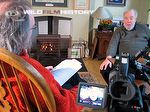Edward Williams

A prolific British documentary composer, Edward Williams is responsible for some of the most memorable music scores from many of the BBC’s major natural history programmes, including the ground-breaking series Life on Earth.
Whilst attending Cambridge University, Edward realised music was his true passion and he abandoned his studies. Under the recommendation of the secretary of the Cambridge Film Society, Edward approached the legendary film conductor Muir Mathieson and was subsequently taken on as an assistant in 1941 for a period of 6 months. After 5 years wartime Navy service, Edward returned as Muir’s assistant for a following 2 years but was eventually sacked as an act of encouragement to gain a musical education, and proceeded to obtain composition lessons from the English composer William Alwyn.
Edward’s career as a composer began in 1947 with the Shell Film Unit’s How an Aeroplane Flies: Thrust. A further 24 shorts for British Transport Films including the OSCAR nominated Journey into Spring in 1957, established Edward as a successful documentary composer. During the 1960s Edward lectured on music at the University of Bristol where his interest in electronic music developed. As a result of an invitation to the BBC by Chris Parsons to debate whether there was a place for music in wildlife films, Edward was asked to do an electronic score using frog calls for The World About Us: Amorous Amphibians. This ultimately led to his appointment as composer for the Life on Earth series in 1979, which famously features the intricate combination of musical score and David Attenborough’s inspiring commentary. Edward has worked on many other well-known BBC programmes including John Sparks’ The Discovery of Animal Behaviour and The Living Isles series.
In 1984 Edward commissioned the design of Soundbeam - a device which uses sensor technology to translate body movement into digitally generated sounds and images and provides profoundly physically or learning impaired individuals the opportunity to be expressive and communicative through music and sound. Edward won a BAFTA TV Cymru award for Best Original Score for the BBC/S4C series Excalibur: The Search for Arthur in 1995.



